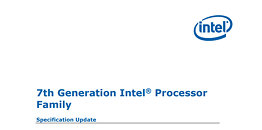Monday, July 17th 2017

Intel Adds New Core CPUs to Its Desktop, Laptop Lineups
Intel has recently updated documentation on their available list of processors based on the 7th generation of the Core Family. These new Kaby Lake-based CPUs will further flesh-out Intel's offerings in both the desktop, laptop, and professional segments with new entries in the Core i3, Kaby Lake-U, and Xeon E3 lines of processors.
The new Core i3 processors make use of the S-0 stepping, instead of the B-0 stepping of previously-released processors. The additions are comprised of the i3-7340 (4.2 GHz, 4 MB cache, 51 W TDP); i3-7320T (3.6 GHz, 4MB cache, 35 W TDP); i3-7120 (4 GHz, 3 MB cache, 51 W TDP); and the i3-7120T (3.5 GHz, 3 MB cache, 35 W TDP.) On the laptop side of the equation, Intel is introducing four new processors: the Core i3-7007U (2 cores, 4 threads, 2.1 GHz, 3 MB cache); the Core i3-7110U (2 cores, 4 threads, 2.6 GHz, 3 MB cache); the Core i5-7210U (2 cores, 4 threads, 2.5 GHz base, 3.3 GHz Turbo, 3 MB cache); and the Core i7-7510U (2 cores, 4 threads, 2.7 GHz base, 3.7 GHz Turbo, 4 MB cache.) Lastly, Intel is adding the new E3-1285 v6 Xeon to its lineup. This one brings increased clock speeds (4.1 GHz base, 4.5 GHz Turbo) with Intel's HD P630 integrated graphics, increasing the TDP by 19 W ( to 91 W) compared to the already existing Xeon E3-1275 v6 - for a 300 MHz clock speed increase. This Xeon should be the new highest-end processor for the iMac, which should place its pricing above the $612 mark previously held by the Xeon E3-1280 v6.
Sources:
Intel, via AnandTech
The new Core i3 processors make use of the S-0 stepping, instead of the B-0 stepping of previously-released processors. The additions are comprised of the i3-7340 (4.2 GHz, 4 MB cache, 51 W TDP); i3-7320T (3.6 GHz, 4MB cache, 35 W TDP); i3-7120 (4 GHz, 3 MB cache, 51 W TDP); and the i3-7120T (3.5 GHz, 3 MB cache, 35 W TDP.) On the laptop side of the equation, Intel is introducing four new processors: the Core i3-7007U (2 cores, 4 threads, 2.1 GHz, 3 MB cache); the Core i3-7110U (2 cores, 4 threads, 2.6 GHz, 3 MB cache); the Core i5-7210U (2 cores, 4 threads, 2.5 GHz base, 3.3 GHz Turbo, 3 MB cache); and the Core i7-7510U (2 cores, 4 threads, 2.7 GHz base, 3.7 GHz Turbo, 4 MB cache.) Lastly, Intel is adding the new E3-1285 v6 Xeon to its lineup. This one brings increased clock speeds (4.1 GHz base, 4.5 GHz Turbo) with Intel's HD P630 integrated graphics, increasing the TDP by 19 W ( to 91 W) compared to the already existing Xeon E3-1275 v6 - for a 300 MHz clock speed increase. This Xeon should be the new highest-end processor for the iMac, which should place its pricing above the $612 mark previously held by the Xeon E3-1280 v6.

53 Comments on Intel Adds New Core CPUs to Its Desktop, Laptop Lineups
www.intel.com/content/www/us/en/processors/processor-numbers.html
Core i7-7600U : 2 cores, 4 threads
Core i7-7920HQ : 4 cores, 8 threads
Intel lets their marketing department have far too much leeway in the naming of their mobile parts. The 7920HQ model qualifies as a real Core i7; that 7600U is nothing more than a glorified Core i3.... :shadedshu:
You have to segment performance in different markets. (as with M-processors, desktop and HEDT). AMD is equally as convoluted you know?
Dual core i7s (U suffix or not) have also caused trouble in the retail market. Go to your local Best Buy, Office Max or other big box store that sells laptops and take a look at them. The higher end ones are of course i7s, but look up the processor model they list. They are dual core!
If you do use workloads that stress the CPU you will buy a workstation-laptop that does not use ULV-processors.
People buy i7s because they are fast. Absolutely not because "they are supposed to be quad-cores". The general public could not care less.
It has frustrated me though: five years ago I bought a $700 quad core i7 laptop for college. I was studying to be an engineer so I wanted something that could run simulations and mathematical software a bit quicker than the cheaper machines. Not long ago it broke and I looked at getting another one (portability is NICE). As far as brick and mortar stores go, you can't buy a quad core i7 laptop for anywhere close to that price. For multithreaded applications (which most of my software was) the new laptops might actually be slower!
(M and Y are below U-processors and Xeons are not relevant)
Hey look, all i7 are Quad-Cores except all the U-models and a Y-option. My god, I was right.
ark.intel.com/products/series/95544/7th-Generation-Intel-Core-i7-Processors#@mobile
All the i5-U are Dual Core, the rest are quad-cores.
ark.intel.com/products/series/95543/7th-Generation-Intel-Core-i5-Processors#@mobile
And here is the exception, all i3-U are dual cores EXCEPT 7100H. I missed one, bo-hoo.
ark.intel.com/products/series/95545/7th-Generation-Intel-Core-i3-Processors#@mobile
www.techpowerup.com/forums/threads/intel-adds-new-core-cpus-to-its-desktop-laptop-lineups.235237/#post-3694560
You put words in my mouth and are insulting them. Great job there buddy.
Why do the industrial E-models matter?
The old Y-models are effectively the exact same as U-processors since they are both for the exact same purpose (Ultrabooks and hybrids). All the ULX-parts are still Dual-cores though.
Core i7 has never stood for Quad-Cores since Nehalem then.
They still don't follow the same naming convention. There are no quad-cores placed below ULV-processors, that should be self-explanatory. Also they are for the same purpose, as I wrote above.
(Core M and Y does not follow the same naming convention, when did they in that case? Haswell? 4+ years ago?)
"And AFAIK all the mobile CPUs that are not U-models are still quad core." Does this mention something about the past and that it has always been this way?
You presume too much.